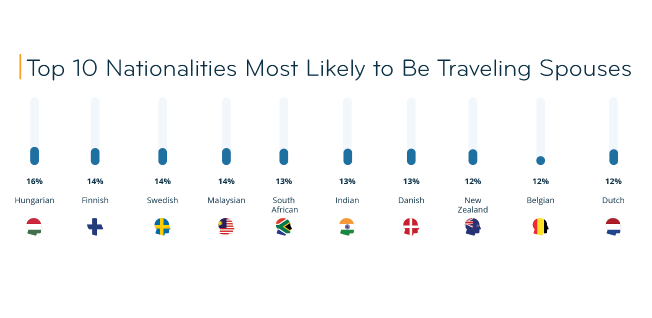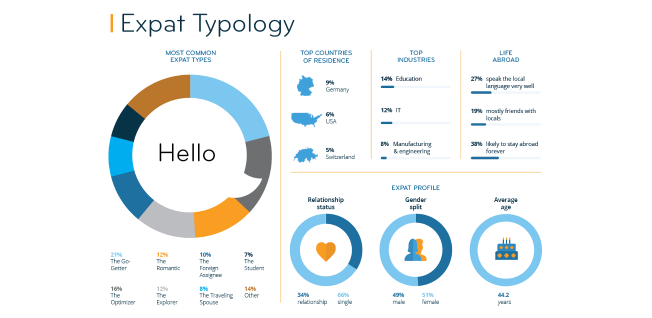The Traveling Spouse: Supporting Their Partner’s Career
Traveling Spouses move abroad for their partner’s job and career, mainly because their partner was sent abroad by their employer (39%) or found a job on their own (31%). While most other expat types have a fairly balanced gender ratio, close to nine in ten Traveling Spouses (86%) are female. “We only live here because of my husband’s work,” a Dutch expat from Kosovo reports. Due to them moving for their partner’s sake, Traveling Spouses are more likely than other expat types to take care of their home and/or children rather than work (27% vs. 5% worldwide) or to be currently looking for work (17% vs. 8% globally). Employees (13%) only make up the third-largest share when it comes to Traveling Spouses’ employment status, while it’s the most-cited employment status worldwide (25%). “I am worried about my future career because my husband is the one who has a job,” a Spanish expat living in the Netherlands explains. And it seems like she isn’t the only one as 41 percent are unsatisfied with their career prospects, compared to 25 percent globally.
Those who do have a job mainly work in education (17% vs. 14% globally), advertising, marketing & communication (10% vs. 6% globally), and IT (8% vs. 12% globally). But it doesn’t always seem to be very rewarding as only 44 percent of Traveling Spouses believe that they make more abroad than they would in a similar job back home, nine percentage points less than the global average (53%). However, it seems like their partners do well in their respective jobs: 22 percent of Traveling Spouses still have a gross yearly household income of more than 150,000 USD at their disposal (vs. 12% globally).
In addition to frequently unsatisfying careers, Traveling Spouses also struggle with settling in abroad on a personal level. One-third (33%) doesn’t feel at home in the local culture, nine percentage points more than the global average (24%). Moreover, 20 percent believe that they will never feel at home abroad, which is the highest share among the seven expat types.
Almost one in three (32%) find it hard to make new friends abroad, and an even higher share has difficulty making local friends in particular (48%). Both results are clearly above the global average (25% and 36%, respectively). Among other factors, this might be due to the language barrier as more than three in ten Traveling Spouses (31%) only speak the local language a little bit and 20 percent don’t speak it at all (vs. 13% worldwide). With Traveling Spouses often facing social isolation, it’s not very surprising that 53 percent are likely to return home at some point — 41 percent even consider this very likely.
Further Reading
In the Words of the Spouse
The Expat Insider Business Edition took a closer look at this expat type and discovered how relocating spouses really feel about life abroad — in their own words.













